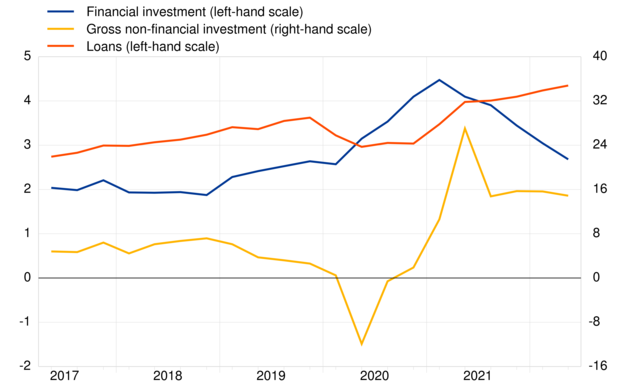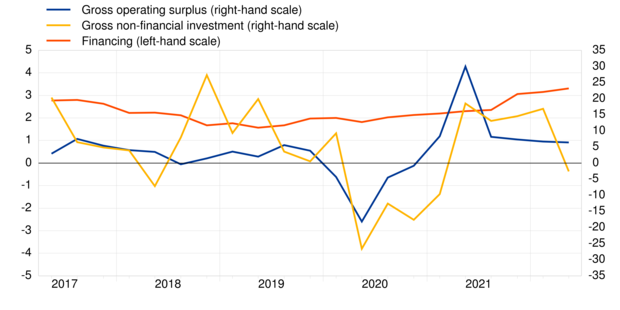- STATISTICAL RELEASE
Households and non-financial corporations in the euro area: second quarter of 2022
5 October 2022
- Households' financial investment increased with annual rate of growth of 2.7% in second quarter of 2022, compared with 3.0% in first quarter of 2022
- Non-financial corporations' financing grew at broadly unchanged rate of 3.3%
- Non-financial corporations' gross operating surplus increased at lower annual rate of 6.4%, after 6.7%
Chart 1
Household financing and financial and non-financial investment
(annual growth rates)

Sources: ECB and Eurostat
Chart 2
NFC gross-operating surplus, non-financial investment and financing
(annual growth rates)

Sources: ECB and Eurostat
Households
Household gross disposable income increased at an annual rate of 6.3% in the second quarter of 2022 (after 5.3% in the previous quarter). Compensation of employees grew at a broadly unchanged rate of 7.7%, while gross operating surplus and mixed income of the self-employed increased at a lower rate of 5.7% (after 6.0%). Household consumption expenditure grew at a lower rate of 13.0% (after 14.0%).
The household gross saving rate (calculated from four-quarter sums) was 15.1% in the second quarter of 2022, compared with 16.3% in the previous quarter.
Household gross non-financial investment (which refers mainly to housing) increased at an annual rate of 14.9% in the second quarter of 2022, down from 15.6% in the previous quarter. Loans to households, the main component of household financing, increased at a broadly unchanged rate of 4.3%, while other liabilities grew at a higher rate of 16.2% (after 12.8%).[1]
Household financial investment increased at an annual rate of 2.7% in the second quarter of 2022, down from 3.0% in the previous quarter. Among its components, currency and deposits grew at a lower rate of 3.7% (after 4.2%). Investment in life insurance and pension schemes increased at a broadly unchanged rate of 1.9% and shares and other equity grew at a lower rate of 2.1% (after 2.6%). Disinvestment from debt securities continued, though at a much slower pace (-0.9%).
Household net worth grew at a lower annual rate of 2.7% in the second quarter of 2022, after 5.6% in the previous quarter. The growth of net worth was predominantly due to valuation gains in non-financial assets, followed by financial and non-financial investment, while the deceleration was mainly driven by higher valuation losses in financial assets. Housing wealth, the main component of non-financial assets, grew at a lower rate of 8.1% (after 8.3%). The household debt-to-income ratio decreased to 95.0% in the second quarter of 2022 from 95.8% in the second quarter of 2021.
Non-financial corporations
Net value added by NFCs increased at a lower annual rate of 10.7% in the second quarter of 2022, after 11.4% in the previous quarter. Gross operating surplus grew at a lower rate of 6.4%, after 6.7% in the previous quarter, and net property income (defined in this context as property income receivable minus interest and rent payable) increased. As a result gross entrepreneurial income (broadly equivalent to cash flow) increased at a lower rate of 5.9% (after 7.7%).[2]
NFCs’ gross non-financial investment decreased (at an annual rate of -2.6%), due to large net disposals of non-produced assets, after a growth of 16.8% in the previous quarter.[3] NFCs’ financial investment increased at an unchanged rate of 5.1%. Compared with the previous quarter, loans granted grew at a lower rate of 6.6% (after 7.2%) and investment in debt securities increased, at a rate of 5.7%, after decreasing in the previous quarter. Currency and deposits, as well as investment in shares and other equity, grew at broadly unchanged rates of 8.6% and 2.2%, respectively.
Financing of NFCs increased at a broadly unchanged annual rate of growth of 3.3%, mirroring the increase in the growth rate of financing via loans (5.4% after 4.6%)[4], while financing via debt securities (5.1% after 5.8%) and trade credits (12.8% after 13.5%) decelerated. Equity financing grew at a broadly unchanged rate of 1.2%.
NFCs’ debt-to-GDP ratio (consolidated measure) decreased to 77.2% in the second quarter of 2022, from 79.7% in the same quarter of the previous year; the non-consolidated, wider debt measure decreased to 140.3% from 142.8%.
For queries, please use the Statistical information request form.
Notes
- The annual growth rate of non-financial transactions and of outstanding assets and liabilities (stocks) is calculated as the percentage change between the value for a given quarter and that value recorded four quarters earlier. The annual growth rates used for financial transactions refer to the total value of transactions during the year in relation to the outstanding stock a year before.
- Hyperlinks in the main body of the statistical release are dynamic. The data they lead to may therefore change with subsequent data releases as a result of revisions. Figures shown in annex tables are a snapshot of the data as at the time of the current release.
Other liabilities comprise other accounts payable (e.g. trade credits), financial derivatives’ net liabilities, and liabilities from pension schemes.
Gross entrepreneurial income is the sum of gross operating surplus and property income receivable minus interest and rent payable.
Gross non-financial investment is the sum of gross fixed capital formation, changes of inventories, and the net acquisition of valuables and non-produced assets (e.g. licences).
Loan financing comprises loans granted by all euro area sectors (in particular MFIs, non-MFI financial institutions and loans from other non-financial corporations) and by creditors that are not resident in the euro area.


